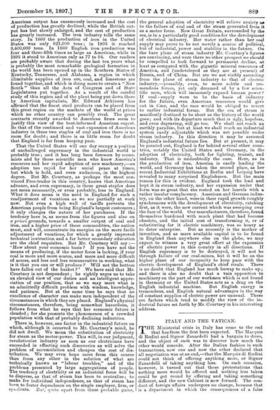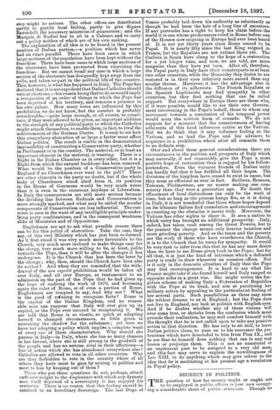ITALY AND THE VATICAN. T HE Ministerial crisis in Italy has
come to the end that has from the first been expected. The Marquis di Rudini and Signor Zanardelli had a bargain to drive, and the object of each was to discover how much the other would concede. After the Italian fashion in such transactions, now one and now the other declared that all negotiation was at an end,—that the Marquis di Rudini could not think of offering anything more, or Signor Zanardelli of taking anything less. On each occasion, however, it turned out that these protestations that nothing more would be offered and nothing less taken could be got round by offering and taking something different, and the new Cabinet is now formed. The con- duct of foreign affairs undergoes no change, because that is a department in which the consequences of a false step might be serious. The other offices are distributed partly to gratify local feeling, partly to give Signor Zanardelli the necessary minimum of guarantees ; and the Marquis di Rudini has to sit in a Cabinet and to carry out a policy neither of which are of his own making. The explanation of all this is to be found in the present position of Italian parties,—a position which has never had an exact parallel. There have been cases in which large sections of the population have been kept without the franchise. There have been cases in which large sections of the electorate have been prevented from exercising the franchise. But we cannot recall any case in which a large section of the electorate has designedly kept away from the polls, and taken no part in the political life of the country. This, however, is what has happened in Italy. The Pope has declared that it is not expedient that Italian Catholics should vote at election s,—his reason being that to do so would imply a recognition of an order of things in which the Pope has been deprived of his territory, and remains a prisoner in his own palace. How many votes are influenced by this prohibition we do not know, but the number is probably considerable,—quite large enough, at all events, to consti- tute, if they were allowed to be given, an important addition to the strength of any political party to which the Catholics might attach themselves, to enable them, in fact, to rival the achievements of the German Centre. It is easy to see how this compulsory abstention of so large a factor must affect Italian politics. The result is visible in the demonstrated impossibility of constructing a Conservative party, whether in Parliament or in the country. The material, or at least an important element in the material, is wanting. There is a Right in the Italian Chamber as in every other, but it is a Right from which the natural backbone has been removed. What would be the position of a Conservative party in England if no Churchmen ever went to the poll? There are other elements in the party no doubt, but if the whole body of Churchmen stood aloof from it, its position in the House of Commons would be very much worse than it is even in the recurrent heydays of Liberalism. In Italy the consequences are still more serious because the dividing line between Radicals and Conservatives is more strongly marked, and what may be called the secular components of Conservatism are less influential. The out- come is seen in the want of any intelligible principle under- lying party combinations, and in the consequent weakness alike of Ministries and of Oppositions.
Englishmen are apt to ask what possible reason there can be for this policy of abstention. Take the case, they say, of this very Ministry which has just been re-formed. As it first stood it was very much more favourable to the Church, very much more inclined to make things easy for the clergy, very much more willing to be, at least, polite towards the Pope, than it will be after the changes it has undergone. It is the Church that has been the loser by the change ; why, then, should the Church have been also its author ? And when they are reminded that the with- drawal of the non expedit prohibition would be taken all over Italy, and all over Europe, as tantamount to an admission on the part of the Pope that he had given up the hope of undoing the work of 1870, and becoming again the ruler of Rome, or of even a portion of Rome, Englishmen are tempted to say, And why not ? What is the good of refusing to recognise facts ? Rome is the capital of the Italian Kingdom, and no reason- able man can suppose that Italy will ever give up its capital, or the Pope ever succeed in recapturing it. We are told that Rome is so elastic, so quick at adapting herself to changed circumstances, so little given to mistaking the shadow for the substance ; yet here we have her adopting a policy which implies a complete want of every one of these characteristics. Why should she pursue in Italy—in Italy, where she has so many chances in her favour, where she is still strong in the goodwill of the people and has no serious rival in their affections—a line of action which she has abandoned everywhere else ? Catholics are allowed to vote in all other countries. Why are they forbidden to vote in the country where of all others they have most to gain by mixing in politics and most to lose by keeping out of them ?
Those who put these questions do not, perhaps, attach sufficient weight to the displeasure with which any dynasty sees itself deprived of a sovereignty it has enjoyed for centuries. There is no reason that this feeling should be confined to an hereditary Sovereign. The last Doge of Venice probably laid down his authority as reluctantly ea though he had been the heir of a long line of ancestors. If any pretender has a right to keep his claim before the world it is one whose predecessors ruled in Rome before one of the Houses now reigning in Europe had ever been heard of. It is not yet thirty years since Rome ceased to be Papal. It is nearly fifty since the last King reigned in France, but the Royalists are not extinct there yet. The Cazlists in Spain have clung to the hope of a restoration for a yet longer time, and now, we are told, are more sanguine than they have yet been. After all, therefore, the Papal party in Italy have their counterparts in at least two other countries, while the Monarchy they desire to see restored is in their eyes infinitely more sacred than any secular throne. Moreover, it has the advantage also in the diffusion of its adherents. The French Royalists or the Spanish Legitimists may find sympathy in other countries, but they find nothing that can be called support. But everywhere in Europe there are those who, if it were possible, would like to see their own Govern- ment intervening in the Pope's behalf, those to whom any movement towards a restoration of his temporal power would seem the noblest form of crusade. We do not suppose for a moment that the consciousness of having adherents of this kind influences action at the Vatican. But we do think that it may influence feeling at the Vatican, and so lead the Pope and his advisers to acquiesce in a prohibition which after all commits them to no definite step. Over and above these general considerations there are circumstances in the position and prospects of Italy which may naturally, if not reasonably, give the Pope a more positive hope of restoration than is enjoyed by his fellow. pretenders. Even the warmest friends of Italian unity can hardly feel that it has fulfilled all their hopes. The divisions of the kingdom have ceased to exist in name, but they seem as effectual as ever in fact. Sicilians, Romans, Tuscans, Piedmontese, are no nearer making one com- munity than they were a generation ago. No doubt the effacement of local distinctions can only be the work of time, but so long as the process hangs fire, as it is doing in Italy, it is not wonderful that those whose hopes depend on its ultimate failure find consolation and encouragement in counting up the obstacles it meets with. Moreover, the Vatican has other sights to cheer it. It sees a nation to which unity has brought no additional prosperity. •Italy, indeed, has taken rank among the Great Powers, but to the peasant the change means only heavier taxation and more grinding poverty. And as the taxes and the poverty are the work of those who have overthrown the Church, it is to the Church that he turns for sympathy. It would be very rash to infer from this that he has any more desire than we have to see Rome given back to the Pope; but for all that, it is just the kind of inference which a defeated party is ready to draw whenever an occasion offers. Nor is it only in the domestic situation of Italy that the Pope may find encouragement. It is hard to say what line France might take if she found herself and Italy ranged on opposite sides in a great war. She might revive the for- gotten scheme of making Italy a Federation of Republics with the Pope at its head, and aim at paralysing her military action by appealing to the particularist feeling of her several parts. Such possibilities as these may seem the wildest dreams to us in England ; but the Pope does not live in England, nor look at politics with English eyes. And if he doubts whether any of these visions will ever come true, or shrinks from the confusion which must precede their realisation, he may well comfort himself with the thought that he is not called upon to take any positive action in that direction. He has only to sit still, to leave Italian politics alone, to pass on to his successor the pre- tensions which have descended to him from Pius IX., and to see that he himself does nothing that can in any way lessen or prejudge them. This is not an unnatural or an unpleasant part to be assigned to a very old man, and this fact may serve to explain the unwillingness of Leo XIII. to do anything which may give colour to the idea that he is meditating at his present age a revolution in Papal policy.







































 Previous page
Previous page